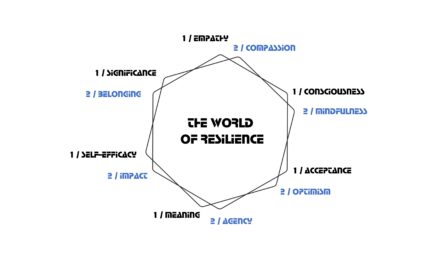Meta-cognition is increasingly becoming a buzz word when it comes to mental health. Just like adopting a meta-perspective, it’s all about getting into the famous helicopter and observing yourself. This is an important skill, especially if you tend to brood, in order to gradually get a grip on what is known as “over-thinking” and eventually be able to stop it completely.
But how exactly does meta-cognition work? And why is it a key to greater resilience and mental health?
At first, meta-cognition refers to nothing more than the ability to think about one’s own thinking. And interestingly, this is something we often don’t do.
Meta-cognition is therefore about developing an awareness of our own thought processes and reflecting on them. This “level of thinking above thinking” allows us to perceive, question and subsequently change our mental behavior patterns. This also makes meta-cognition a superpower to better deal with stress and anxiety.
By observing our own thinking, we very quickly realize that we often simply let our thoughts flow without reflecting on them or directly influencing them – something that many people only realize when they meditate for the first time and are encouraged to “think nothing” and “let their thoughts drift away like clouds” – usually with very limited success.
If we become aware of our thinking, this first leads to us being able to self-assess and evaluate our thinking. This can relate to our own strengths and weaknesses, such as “I have difficulty thinking clearly under stress” or “I learn better when I listen to music”. At the same time, this awareness is the foundation for the ability to actively shape our own thought processes – in other words, to recognize thought patterns, to question the meaningfulness of our thinking, to focus and ultimately to regulate or change our own thinking.
This means that the ability to meta-cognize also has a direct influence on our resilience:
- We can deal with stress and anxiety more consciously: Meta-cognition helps us to recognize how we specifically react in moments of stress or anxiety. This enables us to develop concrete strategies to cope better. Meta-cognition can, for example, help us to recognize when we are stuck in negative thought spirals – so that we can actively stop them.
- We can better regulate our emotions: Meta-cognition also helps us to reflect on our emotions and thus influence them in a targeted way – i.e. to question our emotions or their appropriateness and, for example, instead of acting impulsively, to pause and consider what the best response would be.
- We boost our problem-solving skills: If we succeed in analyzing and understanding our own thought processes through meta-cognition, we enable ourselves to find alternatives, develop creative solutions and act flexibly.
- We are much more likely to develop a growth mindset: Meta-cognition ultimately also supports us in looking at experiences less from an ego-centered perspective and classifying them more objectively. This helps us to interpret mistakes not as personal failures, but as opportunities to learn and grow.
All of this also makes meta-cognition a key tool for mental health by strengthening our ability to understand and control our own thoughts and feelings:
- We can better recognize and question negative thought patterns: Negative thought spirals or brooding can be extremely stressful and are not only driving stress and anxiety, but are also a real killer of resilience. Meta-cognition helps us to recognize and question these patterns at an early stage. As a result, we learn not to view our thoughts as the absolute truth, but to critically question and examine them.
- We can develop a new form of mindfulness: meta-cognition enables us to develop a type of mindfulness in which we focus not only on the present moment, but also on how we experience and evaluate this moment. This can help to reduce stress and increase mental resilience.
- We improve our emotional intelligence: those who reflect on their thoughts and feelings develop a better understanding of themselves and others. This strengthens our ability to empathize – and subsequently our relationships with ourselves and others – and thus has a positive effect on our mental health.
But how can we actively strengthen our ability for meta-cognition?
The good news is that you can train meta-cognition like a muscle, as with awareness and mindfulness. This is possible through the following practices and exercises, among others:
- Invest time in self-reflection: Daily reflection questions such as “What did I learn today?” or “How did I react to a difficult situation?” or “What did I think and feel at that moment, and was it appropriate for the situation?” can help you to better understand, question and, if necessary, refocus your own thought processes.
- Use journaling: Keeping a journal or diary allows you to write down thoughts and emotions and look at them from a distance. This often opens up completely different perspectives and a deeper understanding, which is usually not possible in the situation of the experience.
- Train mindfulness: For many people, exercises such as meditation are a first step into meta-cognition. They sharpen perception and awareness of thoughts and feelings – and foster the ability to control them. The next step is to use this awareness to make it applicable in everyday situations.
- Foster multi-perspectivity: In addition to exploring and understanding our own thoughts, conversations with others help us to recognize blind spots in our thinking and adopt new perspectives.
In summary, we can conclude that meta-cognition is an essential skill that goes far beyond simply reflecting on our own thoughts and has a major influence on our resilience. It helps us to regulate and direct our thoughts and emotions, deal with stress in a healthier way and strengthen our emotional and mental health. Those who consciously train their meta-cognitive skills are investing in resilience and long-term well-being. Because the key to a healthy mind lies in understanding yourself and thereby growing beyond yourself.





